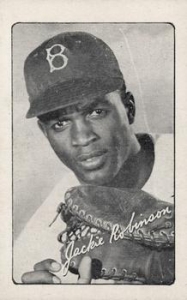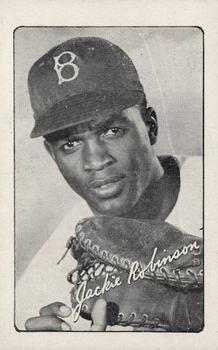April 22, 1947: Jackie Robinson’s first meeting with Ben Chapman
 Sometimes all of the elements of the story of a ballgame are not known right away. The score is known but quite often the story of the game goes far beyond the score and so it was on April 22, 1947. For the record, the Brooklyn Dodgers defeated the Philadelphia Phillies 1-0 in the opener of a three-game series at Ebbets Field. Not immediately known was the verbal abuse visited on Jackie Robinson from the Philadelphia dugout.
Sometimes all of the elements of the story of a ballgame are not known right away. The score is known but quite often the story of the game goes far beyond the score and so it was on April 22, 1947. For the record, the Brooklyn Dodgers defeated the Philadelphia Phillies 1-0 in the opener of a three-game series at Ebbets Field. Not immediately known was the verbal abuse visited on Jackie Robinson from the Philadelphia dugout.
The story of this game, as reported in the next day’s Brooklyn Eagle is best shown in a line attributed to winning pitcher Hal Gregg, who had thrown a one-hitter.
“It was a bad pitch (Del) Ennis hit.”1
On a very cold April afternoon, a double by Del Ennis on a changeup with two out in the first inning was the only blemish on a stellar performance by Gregg in his first start of the season. After Ennis’s double, Gregg issued an intentional pass to Ron Northey and then retired the next 20 batters in a row. That streak was broken when he hit Andy Seminick with a pitch with one out in the eighth inning.
The Phillies’ pitching was almost as good. as Dutch Leonard scattered nine hits and baffled the Dodgers hitters, when it mattered, with an array of knuckleballs. He didn’t allow a hit until Eddie Stanky opened the fourth inning with a single. The Dodgers’ single tally, which was aided by an error, came in the eighth inning.
Brooklyn loaded the bases with none out in the sixth inning but failed to score. Singles by Stanky and Robinson and a walk to Pete Reiser loaded the bases. Leonard fielded Dixie Walker’s slow roller in time to make a diving throw to force Stanky at the plate. Ron Northey in right field then grabbed a foul ball off the bat of Gene Hermanski and gunned down Robinson trying to score from third.
In 1947 the impact of Jackie Robinson was felt in virtually every game. In the eighth inning on April 22, he shined in the field, at the plate, and on the bases. In the Phillies half of the inning, Seminick was on first base with one out, Robinson made a spectacular play at first base to rob Emil Verban of a hit. Verban’s hard-hit groundball was far to the right of Robinson and on its way to right field when Robinson dived for the ball, gloved it, and raced to first base to beat Verban to the bag. Philadelphia manager Ben Chapman then let Leonard hit for himself and Gregg struck out the Philadelphia pitcher for the final out of the inning.
In the Dodgers’ half of the inning, Robinson singled, hitting a popup behind second base just beyond the reach of shortstop Skeeter Newsome and second baseman Verban. The next batter was Reiser. After five knuckleballs, Robinson took off for second base. Reiser swung wildly at the pitch and struck out. The ball went a short distance away from catcher Seminick. He tried to gun down Robinson at second base, but his throw went to center field and Jackie went to third base. On the play, Robinson was credited with a steal and Seminick was charged with a throwing error that allowed Robinson to advance further.
After a walk to Dixie Walker, Hermanski came to the plate. Hermanski and pitcher Leonard engaged in a classic pitcher-batter confrontation. Of the first nine pitches, six were strikes, each fouled off by Hermanski. The other three were balls. On the 10th offering of the at-bat, Hermanski found a pitch to his liking. He lined the ball to center field and when Johnny Wyrostek failed to make a shoestring catch, Robinson scored. The Dodgers threatened to extend their lead but with the bases loaded and two out, Pee Wee Reese, mired in a major batting slump, struck out to end the inning. The Dodgers shortstop, however, would have his redemption when Philadelphia came to bat in the ninth inning.
“Reese ignored the limitations of a normal infielder.”
– New York Herald Tribune2
In the ninth inning with two out, Philadelphia – without the benefit of a hit – threatened to tie the game. Ennis walked and a grounder by Northey went through Robinson’s legs for his first error since joining Brooklyn. The next batter, Nick Etten, sent a groundball up the middle, but Reese dashed over from his shortstop position to field the ball and, from 10 feet away, threw backhanded to Stanky at second for the force play that ended the game. The shivering 9,790 fans at the game, who endured a 45-degree afternoon, leapt to their feet to applaud the man who would be named Dodgers captain in 1950, and Robinson sprinted to Reese from his position at first to join in the celebration of Pee Wee’s spectacular game-ending play.
That same day, it was announced that Dodgers President Branch Rickey had been awarded the Benny Leonard Memorial Trophy3 by the Maccabi Association for “the year’s outstanding contribution to good sportsmanship.” Factoring largely in the award was Rickey’s role in the signing of Robinson and the integration of major-league baseball.4
Robinson’s two hits on April 22 brought his batting average to .444. He had a modest four-game hitting streak going. After going hitless on Opening Day, he was 8-for-18 in Brooklyn’s next four games through April 22. The next evening, Robinson appeared on the radio program Information Please. But unbeknownst to most fans, much more was going on.
Within two weeks of the April 22 game, another story surfaced that put the great performance by Gregg in the background and brought the challenges that Robinson faced in 1947 to the forefront.
The first inkling that there was a problem was in a small piece that appeared in the Boston Herald on April 27 stating that the Phillies had received a letter (it did not indicate the source of the letter but it was subsequently determined that the letter came from the office of National League President Ford Frick) reminding them that “jockeying” ballplayers is all right but that profanity should be left in the locker room – particularly when Jackie Robinson is playing.”5
That same day, Shirley Povich wrote in the Washington Post, “The Phillies thus far are the only club to give Jackie Robinson of the Dodgers a fierce riding from the bench, with manager Ben Chapman setting the pace.”6
Chapman maintained that the jockeying was not malicious, saying, “We are not making a target of Robinson. Jockeying from the bench was regular long before I was born.”7 Jack Saunders of the Pittsburgh Courier interviewed Chapman in Philadelphia on April 29, and the Philadelphia manager admitted that prior to the series in Brooklyn, he had instructed his bench jockeys to give it to Robinson without restraint. He said he told his players to call Robinson everything and anything they wanted to. He assured him that they had his unswerving support.8
Chapman’s comments appeared in the May 3 issue of the Pittsburgh Courier. Earlier, a fan who had been at the games in Brooklyn had contacted the commissioner’s office. In the game on April 22, the Philadelphia manager and his players had used every measure of verbal abuse against Robinson. Fans near the dugout heard the abuse and registered complaints with the National League president, Ford Frick. That led to Frick’s reprimand prior to Brooklyn’s first trip to Philadelphia.
Robinson addressed and downplayed the abuse in the Pittsburgh Courier on May 3, saying, “[S]ome of the Phillies bench jockey’s [sic] tried to get me upset last week, but it didn’t really bother me.”9 Bothered or not, Robinson went into an 0-for-20 slump from April 23 to May 1.
On the evening of May 4, Walter Winchell, on his nationwide radio broadcast, broke the story. On May 5, Commissioner Happy Chandler issued a very severe warning, an order restraining the Phillies from using “vicious un-American racial remarks” against Robinson when Brooklyn visited Philadelphia in early May.10
The order was delivered to the Phillies’ general manager, Herb Pennock, by Walter Mulbry, secretary-treasurer of the commissioner’s office. According to Mulbry, “Mr. Chandler said that no favors should be granted Robinson from the bench, but there is a limit to everything and he thought that hurling racial epithets was beyond that limit.”11 A photographer had Chapman and Robinson pose together, as if there were no tensions, and the photograph appeared in the Philadelphia Inquirer on May 10.
In his 1972 autobiography, Robinson addressed the events of April 22, 1947, and said that the day “brought me nearer to cracking up than I ever had been.”12
Sources
In addition to Baseball-Reference.com and the sources shown in the Notes, the author used:
Baumgartner, Stan. “Feller, Gregg Pitch One-Hitters, Hal Blanks Phils for Dodgers, 1-0,” Philadelphia Inquirer, April 23, 1947: 30.
Mardo, Bill. “Gregg’s 1-Hitter Stops Phils, 1-0,” Daily Worker (New York), April 23, 1947: 10.
Woodward, Stanley. “National League Averts Strike of Cardinals Against Robinson’s Presence in Baseball,” New York Herald Tribune, May 9, 1947: 24.
Young, Dick. “Gregg Spins One Hitter, Flock Blanks Phils, 1-0,” New York Daily News, April 23, 1947: 66.
Notes
1 Harold C. Burr, “Gregg Barred from Hall of Fame Three Times on Single Bingle,” Brooklyn Daily Eagle, April 23, 1947: 19.
2 Bob Cooke, “Gregg’s One-Hitter Subdues Phillies for Dodgers, 1-0,” New York Herald Tribune, April 23, 1947: 34.
3 Leonard, a former lightweight boxing champion, had died just four days earlier.
4 “Branch Rickey Honored – Will Get Leonard Trophy for Promoting Racial Tolerance,” New York Times, April 23, 1947: 34.
5 Boston Herald, April 27, 1947: 54.
6 Shirley Povich, “This Morning,” Washington Post, April 27, 1947: M12.
7 Hy Turkin, “Police Investigate Poison Pen Threats to Jackie Robinson,” New York Daily News, May 10, 1947: 25.
8 Wendell Smith, “‘Stop Race Baiting’ – Chandler: Phillies Warned by Baseball Czar Over Robinson Incident,” Pittsburgh Courier, May 10, 1947: 1, 4.
9 Jackie Robinson, “Jackie Robinson Says,” Pittsburgh Courier, May 3, 1947: 15.
10 Smith.
11 Smith.
12 Jackie Robinson (as told to Alfred Duckett), I Never Had It Made, (New York, G.P. Putnam’s Sons, 1972), 71.
Additional Stats
Brooklyn Dodgers 1
Philadelphia Phillies 0
Ebbets Field
Brooklyn, NY
Box Score + PBP:
Corrections? Additions?
If you can help us improve this game story, contact us.


